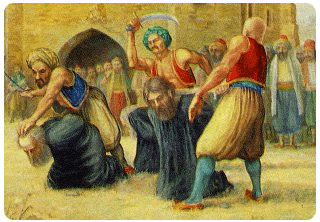
Τὸ νὰ μιλᾷ κανένας σήμερα καὶ νὰ γράφει γιὰ κάποια πράγματα τῆς θρησκείας, ὁ πολὺς κόσμος τὸ νομίζει γιὰ ἀνοησία.
Καὶ ἀκόμα μεγαλύτερη ἀνοησία ἔχει τὴν ἰδέα πὼς εἶναι τὸ νὰ γράφει γιὰ τοὺς ἅγιους μάρτυρες, καὶ μάλιστα γιὰ κείνους ποὺ μαρτυρήσανε κατὰ τὰ νεότερα χρόνια ποὺ βασιλεύανε οἱ Τοῦρκοι ἀπάνω στὴ χριστιανοσύνη,
ἐπειδὴς ὁ λίγος καιρὸς ποὺ μᾶς χωρίζει ἀπ᾿ αὐτοὺς κάνει ὥστε νὰ τοὺς νιώθουμε πολὺ κοντά μας, ἀνθρώπους σὰν κ᾿ ἐμᾶς, ἐνῷ τοὺς ἀρχαίους μάρτυρες τοὺς βλέπουμε μέσα ἀπὸ τοὺς αἰῶνες ποὺ περάσανε ἀπὸ τότε ποὺ μαρτυρήσανε καὶ στὴ φαντασία μας παρουσιάζονται εὐκολότερά με τὸν φωτοστέφανο τοῦ ἁγίου.
Κανένας λαὸς δὲν ἔχυσε τόσο αἷμα γιὰ τὴν πίστη τοῦ Χριστοῦ ὅσο ἔχυσε ὁ δικός μας, ἀπὸ καταβολὴ τοῦ χριστιανισμοῦ ἴσαμε σήμερα.
Κι αὐτὸς ὁ ματωμένος ποταμὸς εἶναι μιὰ πορφύρα ποὺ φόρεσε ἡ ὀρθόδοξη Ἐκκλησία μας, καὶ ποὺ θά ᾽πρεπε νὰ τὴν ἔχουμε γιὰ τὸ μεγαλύτερο καύχημα, κι ὄχι νὰ τὴν καταφρονοῦμε καὶ νὰ μὴ μιλοῦμε ποτέ γι᾿ αὐτή, καὶ μάλιστα νὰ ντρεπόμαστε νὰ μιλήσουμε γι᾿ αὐτή, σὲ καιρὸ ποὺ δὲ ντρεπόμαστε γιὰ τὶς πιὸ ντροπιασμένες καὶ σιχαμερὲς παραλυσίες ποὺ κάνουνε οἱ ἄνθρωποι στὸν ἀδιάντροπο καιρό μας.
Ἐμεῖς οἱ σημερινοὶ πονηρεμένοι ἄνθρωποι φροντίζουμε μονάχα γιὰ τὴν καλοπέραση τοῦ κορμιοῦ μας, καὶ γιὰ τοῦτο ἡ ψυχή μας ἔχασε τὴν εὐαισθησία της, μ᾿ ὅλα τὰ πνευματικὰ γιατρικὰ ποὺ λέμε πὼς ἔχουμε. Καὶ γι᾿ αὐτὸ περιφρονοῦμε καὶ τοὺς λέμε ἀνόητους ἐκείνους ποὺ δὲν κοιτάζουνε τὸ ὑλικὸ συμφέρο τους, ἀλλὰ κάνουνε κάποιες θυσίες.
Κατὰ πολὺ ἀνόητους καὶ μικρόμυαλους θεωροῦμε ἐκείνους ποὺ θυσιάσανε τὴ ζωή τους γιὰ τὴν πίστη τους, ἀφοῦ, κατὰ τὴν ἁμαρτωλὴ κρίση μας, δὲν κοιτάξανε νὰ χαροῦνε τὰ νιάτα τους καὶ ν᾿ ἀπολάψουνε τοῦτον τὸν κόσμο, ποὺ εἶναι χειροπιαστὸς καὶ σίγουρος, ἀλλὰ βασανιστήκανε, φυλακωθήκανε, δαρθήκανε καί, στὸ τέλος, σφαχτήκανε ἢ κρεμαστήκανε, οἱ ἄμυαλοι, γιὰ κάποιους ἴσκιους ποὺ λέγουνται ἀθάνατη ζωὴ καὶ βασιλεία τῶν οὐρανῶν...
...Μ᾿ αὐτὰ τὰ λόγια βροντοφωνεῖ πὼς ἡ Ἐκκλησία μας, μὲ τὰ μαρτύρια ποὺ τραβᾷ ἀπὸ αἰῶνες, εἶναι ἡ ἀληθινὴ Ἐκκλησία, ἡ βλογημένη ἀπὸ τὸν Κύριο, κι ὄχι ἡ Δυτική, ἡ καλοπερασμένη ἡ ὑπερήφανη ἀφέντρα, ποὺ ὄχι μονάχα τὸ αἷμα της δὲν ἔχυσε γιὰ τὸν Χριστό, ἀλλὰ ἡ ἴδια ἔκαιγε τοὺς ἀνθρώπους ποὺ δὲν τῆς ἤτανε ὑπάκουοι.
Οἱ δικοί μας οἱ ἅγιοι, ποὺ μαρτυρήσανε στὸν καιρὸ ποὺ εἴμαστε σκλάβοι στοὺς Τούρκους, ἤτανε ταπεινοί, ἁπλοί, λιγομίλητοι, μὲ τὴ φωτιὰ τῆς πίστης στὰ στήθιά τους, ἀπονήρευτοι κι ἀγράμματοι, ἀφοῦ τὸ μόνο ποὺ γνωρίζανε νὰ λένε μπροστὰ στὸν ἀγριεμένο τὸν κριτὴ ἤτανε «Χριστιανὸς γεννήθηκα καὶ Χριστιανὸς θ᾿ ἀποθάνω!».
Νέοι ἄνθρωποι, παλληκάρια ἀπάνω στ᾿ ἄνθος τῆς νιότης τους, πηγαίνανε προθυμερὰ νὰ παραδοθοῦνε γιὰ τ᾿ ὄνομα τοῦ Χριστοῦ, κι ἀντὶς ἀρραβωνιάσματα σφαζόντανε σὰν τ᾿ ἀρνιὰ ἡ κρεμαζόντανε μὲ τὴ θελιὰ στὸν λαιμό τους καί, γιὰ νὰ τοὺς τυραγνᾶνε περισσότερο οἱ ἄπιστοι, κόβανε τὸν λαιμό τους σιγὰ -σιγὰ μὲ στομωμένα μαχαίρια ἢ τοὺς χωρίζανε μὲ σάπια σχοινιὰ ποὺ κοβόντανε, γιὰ νὰ τοὺς ξανακρεμάσουνε.
Καὶ τὰ μόνα ποὺ ξέρανε ἀπὸ τὴ Θρησκεία μας οἱ περισσότεροι ἀπ᾿ αὐτοὺς ἤτανε τὰ λόγια τοῦ Χριστοῦ, ποὺ εἶπε: «Ὅποιος μὲ ὁμολογήσει μπροστὰ στοὺς ἀνθρώπους, θὰ τὸν ὁμολογήσω κ᾽ ἐγὼ μπροστὰ στὸν Πατέρα μου, ποὺ εἶναι στὸν οὐρανό, κι ὅποιος μ᾿ ἀρνηθεῖ μπροστὰ στοὺς ἀνθρώπους, θὰ τὸν ἀρνηθῶ κ᾿ ἐγὼ μπροστὰ στὸν Πατέρα μου, ποὺ εἶναι στὸν οὐρανό». Καθὼς καὶ τὰ λόγια τοῦτα, ποὺ εἶπε ὁ Κύριος: «Μὴ φοβηθεῖτε ἀπὸ κείνους ποὺ σκοτώνουνε τὸ σῶμα, μὰ ποὺ δὲν μποροῦνε νὰ σκοτώσουνε τὴν ψυχή», καί: «Ὅποιος χάσει τὴ ζωή του γιὰ τ᾿ ὄνομά μου, αὐτός θὰ ζήσει στὴν αἰώνια ζωή».
Ὤ! Τί ὕψος καὶ πόση πνευματικὴ εὐπρέπεια εἶχε ἡ φυλή μας, τὸν καιρὸ ποὺ θαρροῦμε ἐμεῖς πὼς ἤτανε ἀγράμματη καὶ βάρβαρη. Ἐμεῖς, οἱ σημερινοί, εἴμαστε βάρβαροι, ποὺ δὲν εἴμαστε σὲ θέση νὰ νιώσουμε ὅσο πρέπει την εὐγένεια καὶ τὸ μεγαλεῖο τῆς θυσίας γιὰ τ᾿ ὄνομα τοῦ Χριστοῦ, ποὺ τὴν προσφέρανε μὲ τὰ κορμιά τους ἐκεῖνοι οἱ λεονταρόψυχοι, ποὺ γι᾿ αὐτοὺς λέγει ὁ εὐαγγελιστὴς Ἰωάννης πὼς δὲν γεννηθήκανε ἀπὸ αἵματα, μήτε ἀπὸ θέλημα τῆς σάρκας, μήτε ἀπὸ θέλημα ἀντρός, ἀλλὰ πὼς γεννηθήκανε ἀπὸ τὸν Θεό. Ἡ γενεὰ ἡ δική μας, «ἡ μοιχαλὶς καὶ ἁμαρτωλός», ἂς κάνει τὸν ἔξυπνον ἐκεῖ ποὺ δὲν χωρᾷ καμιὰ ἐξυπνάδα, ἂς περιπαίζει ἐκείνους ποὺ δώσανε τὸ αἷμα τους γιὰ τὴν πίστη τοῦ Χριστοῦ, μὲ τὴν ἐλπίδα τῆς αἰώνιας ζωῆς. Θὰ ἔρθει μέρα ποὺ θὰ δώσει ἀπολογία καὶ σὲ τοῦτο τὸν κόσμο καὶ στὸν ἄλλον, καὶ τότε θὰ καταλάβει σὲ τί σκοτάδι βρισκότανε...
ΦΩΤΗΣ ΚΟΝΤΟΓΛΟΥ
[«Πονεμένη Ρωμιοσύνη», ἐκδ. «Ἀστήρ»]
http://agiameteora.net/

Saint Nicodemus the Hagiorite
Your constant care should be not to let your heart become agitated or troubled, but to use every effort to keep it peaceful and calm. Seeing your efforts and endeavours, God will send you His grace and will make your soul a city of peace. Then your heart will become the house of comfort as is allegorically expressed in the following Psalm: ‘Jerusalem is builded as a city’ (Ps. 122, 3). God has required only one thing from you, that every time you are disturbed by something, you should immediately restore peace in yourself, and should thus remain undisturbed in all your actions and occupations. You must know that this requires patience; for just as a city is not built in a day, you cannot expect to gain inner peace in a day. For gaining inner peace means building a house for the God of peace and a tabernacle for the Almighty, and in this way becoming a temple of God. You must also know that it is God Himself Who builds this house in you, and without Him all your labour will be in vain, as it is written: ‘Except the Lord build the house, they labour in vain that build it’ (Ps. 127, 1). You must know too that the main foundation of this peace of heart is humility and avoidance of actions, works and occupations which bring worry and care. As regards the first – who does not know that humility, peace of heart and meekness are so closely related that where one is, the other is too.
A man whose heart is at peace and who is meek is also humble, and a man who is humble in heart, is also meek and at peace. This is why our Lord joined them indissolubly together, saying: ‘Learn of me; for I am meek and lowly in heart’ (Matt. 11, 29). As regards the second, we see its prototype in the Old Testament, namely, in the fact that God wished His house to be built not by David, who spent almost all his life in wars and tribulations, but by his son Solomon, who, by his name, was a peaceful king and fought no one.
To preserve inner peace:
(1) First of all keep your outer senses in order and flee all licentiousness in your external conduct, – namely,
neither look, speak, gesticulate, walk nor do anything else with agitation, but always quietly and decorously. Accustomed to behave with decorous quietness in your external movements and actions, you will easily and without labour acquire peace within yourself, in the heart; for, according to the testimony of the fathers, the inner man takes his tone from the outer man.
(2) Be disposed to love all men and to live in accord with everyone, as St. Paul instructs: ‘If it be possible, as much as lieth in you, live peaceably with all men’ (Rom. 12, 18).
(3) Keep your conscience unstained, so that it does not gnaw at you or reproach you in anything, but is at peace in relation to God, to yourself, to your neighbours, and to all external things. If your conscience is thus kept clean, it will produce, deepen and strengthen inner peace, as David says: ‘Great peace have they which love thy law: and nothing shall offend them’ (Ps. 119, 165).
(4) Accustom yourself to bear all unpleasantness and insults without perturbation. It is true that before you acquire this habit you will have to grieve and suffer much in your heart through lack of experience in controlling yourself in such cases. But once this habit is acquired, your soul will find great comfort in the very troubles you meet with. If you are resolute, you will day by day learn to manage yourself better and better and will soon reach a state when you will know how to preserve the peace of your spirit in all storms, both inner and outer.
If at times you are unable to manage your heart and restore peace in it by driving away all stress and griefs, have recourse to prayer and be persistent, imitating our Lord and Saviour, Who prayed three times in the garden of Gethsemane, to show you by His example that prayer should be your refuge in every stress and affliction of the heart and that, no matter how faint-hearted and grieved you may be, you should not abandon it until you reach a state when your will is in complete accord with the will of God and, calmed by this, your heart is filled with courageous daring and is joyfully ready to meet, accept and bear the very thing it feared and wished to avoid; just as our Lord felt fear, sorrow and grief, but, regaining peace through prayer, said calmly: ‘Rise, let us be going: behold, he is at hand that doth betray me’ (Matt. 26, 46).
Source: Unseen Warfare as edited by Nicodemus of the Holy Mountain and revised by Theophan the Recluse, via http://easternorthodoxspirituality.blogspot.gr/
http://pemptousia.com/

